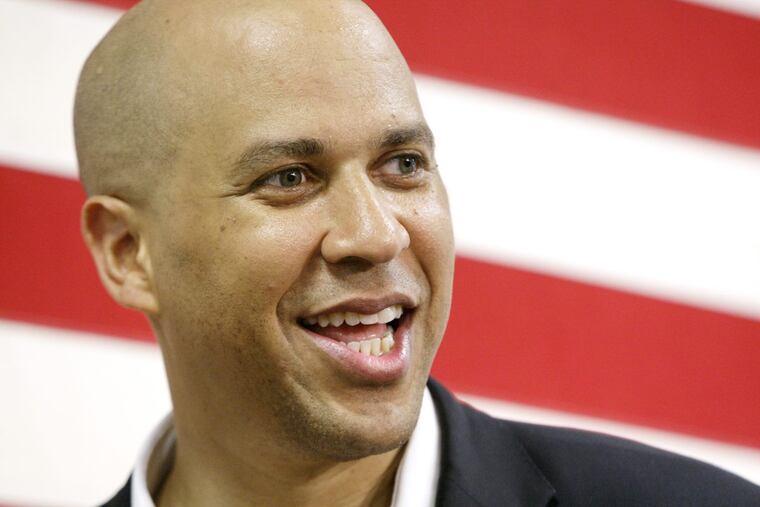Sen. Cory Booker introduces plan to legalize marijuana
His plan to legalize marijuana sets him up for a direct clash with Attorney General Jeff Sessions, who has urged a crackdown on drug offenses.

WASHINGTON — In a direct challenge to the Trump administration, Sen. Cory A. Booker (D., N.J.) introduced a bill Tuesday to legalize marijuana under federal law, laying down a notable political and policy marker as many eye him as a potential future presidential candidate.
Booker's plan, rolled out in a Facebook live post, sets him up for a direct clash with Attorney General Jeff Sessions, who has urged a crackdown on drug offenses.
Booker's proposal dovetails with his long-standing advocacy for sweeping reforms to lessen sentences for nonviolent crimes. He argued Tuesday that minorities were disproportionately arrested and jailed for marijuana offenses.
"We are not seeing the equal application of the criminal justice system," Booker said on Facebook, arguing that people in poor minority communities are often left with criminal records for using a drug that is common on college campuses and has been used by members of Congress.
Booker is not the first to push for federal legalization: Sen. Bernie Sanders (Ind., Vt.) proposed the idea in 2015. But Booker went further by threatening to strip states of some federal aid if they arrested or jailed an unusually high percentage of minorities or low-income individuals for marijuana offenses.
Those states could lose funding for building or staffing prisons and some of their law enforcement grants — which Booker characterized as a way to incentivize more states to legalize marijuana.
While his bill has no cosponsors and next to no chance of becoming law in the current Congress, Booker's announcement stakes out a platform on the left side of a major national issue with growing tension: More than half the states now allow medical marijuana, but Sessions has pushed to combat the drug's increased acceptance and boost prosecutions.
He has asked Congress to unravel rules that protect states that have legalized medical marijuana. That would allow him to prosecute medical-marijuana outfits in the 29 states and District of Columbia that have legalized them, and go after recreational pot in the eight states where it's allowed. Later this week the Department of Justice is scheduled to release a report that supporters of legalization fear would link marijuana to violent crime and open the door to tougher punishments for pot-related offenses. Sessions has linked the drug to psychiatric problems, cognitive disorders, and addiction.
Earlier this year Sessions wrote that Congress should undo medical-marijuana protections "in the midst of an historic drug epidemic and potentially long-term uptick in violent crime."
Booker — who has long battled Sessions and vocally opposed his nomination — said the attorney general was moving in the wrong direction.
Marijuana advocates hailed Booker's plan as the boldest proposal ever on the subject.
"This bill is the most ambitious marijuana bill we have seen in Congress," Queen Adesuyi, policy associate at the Drug Policy Alliance, said in Booker's news release. "Uniquely, it recognizes the fact that people of color have borne the brunt of the failed war on drugs and seeks to repair the damage done."
The Pennsylvania legislature has legalized medical marijuana for people with certain conditions. In New Jersey, where medical marijuana is legal, a bill was introduced in May to OK recreational pot — though Gov. Christie has vowed to veto it if it ever were to reach his desk.
"Ending federal marijuana prohibition would bring the law in line with the opinion of the growing majority of Americans who want states to be able to enact their own marijuana laws without harassment by the DEA," attorney Shaleen Title, a founding board member of the Minority Cannabis Business Association and founder of THC Staffing Group, said in a statement from the Drug Policy Alliance.
Booker's bill would legalize marijuana under federal law and retroactively expunge the records of people convicted for marijuana use or possession. Federal funds withheld from states under the law would go toward a fund that would invest in communities that Booker says have been hit hard by drug laws.